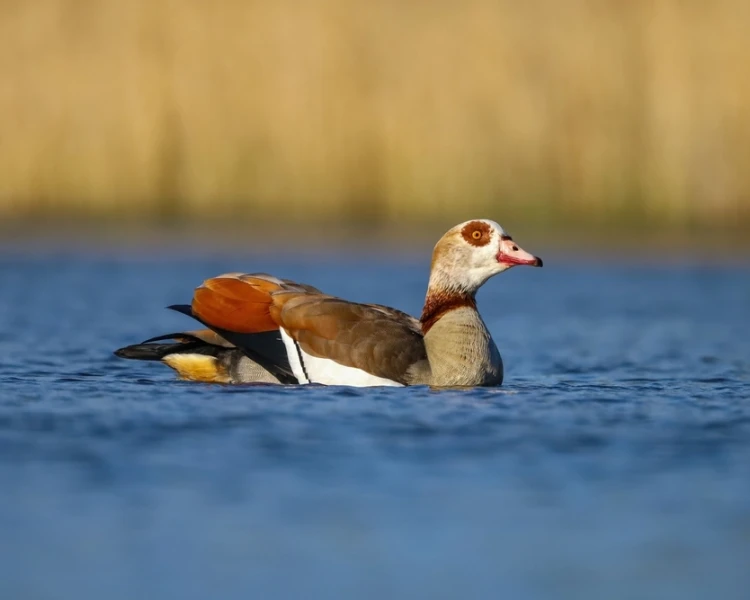10 Fun Facts About The Egyptian Goose
Are you interested in learning more about the Egyptian Goose?
This bird is native to Africa and has become a popular species around the world. Egyptian Geese are fascinating creatures that have unique characteristics and behaviors. In this article, we will explore ten fun facts about the Egyptian Goose that you may not know about.
1. Appearance and Physical Features
Egyptian Geese have a striking appearance with their chestnut brown feathers, distinctive eye markings, and long necks. They are medium-sized birds, with males weighing around 1.6 kg and females weighing around 1.4 kg. Their wingspan is about 1.6 meters, and their height ranges from 63 to 73 centimeters.
2. Habitat and Range
Egyptian Geese are found in a variety of habitats, including wetlands, savannas, and grasslands. They are widespread in Africa, from the Nile Valley to the southern regions of the continent. In recent years, they have been introduced to other parts of the world, such as Europe and North America.
3. Breeding Habits
Egyptian Geese are monogamous and form strong pair bonds. They mate for life and remain together year-round. They usually breed during the rainy season when the water levels rise, providing more food and shelter for their offspring.
4. Nesting Behaviors
Egyptian Geese are territorial and often defend their nests aggressively. They build their nests in a variety of locations, including trees, shrubs, and on the ground. The female lays 5 to 12 eggs, and both parents take turns incubating the eggs for around 28 to 30 days.
5. Vocalizations
Egyptian Geese are known for their loud honking calls, which they use to communicate with each other. Their calls can be heard from long distances and are often used to mark their territory or to signal danger.
6. Feeding Habits
Egyptian Geese are herbivorous and mainly feed on grasses, seeds, and other vegetation. They will also eat insects and small aquatic animals if necessary. They are diurnal and are most active in the early morning and late afternoon.
7. Social Behaviors
Egyptian Geese are social birds and often gather in flocks, especially during the non-breeding season. They have a hierarchical social structure, with dominant birds leading the flock.
8. Lifespan
Egyptian Geese can live up to 25 years in the wild. However, their lifespan is often shorter due to predation, disease, or hunting.
9. Relationship with Humans
Egyptian Geese have a long history of association with humans, dating back to ancient Egyptian times. They were considered sacred by the Egyptians and were often depicted in their artwork. Today, they are often found in parks and gardens, where they are enjoyed by people for their beauty and unique behaviors.
10. Conservation Status
Egyptian Geese are not considered endangered, with their population being stable throughout much of their range. However, they face threats such as habitat loss, hunting, and competition with introduced species in some areas.
Wrap-Up: 10 Fun Facts About the Egyptian Goose
The Egyptian Goose is a fascinating bird with a unique set of behaviors and physical characteristics. Learning more about this species can help us appreciate the diversity of life on our planet and inspire us to protect the natural world.
Fun Facts About the Egyptian Goose FAQs
What is an Egyptian Goose?
The Egyptian Goose is a species of waterfowl native to Africa. They have distinctive brown and white feathers, with a dark brown patch around their eyes.
Where do Egyptian Geese live?
Egyptian Geese are found in various habitats across Africa, including wetlands, savannas, and grasslands. They are also commonly found in urban areas and can be seen in parks and gardens.
What do Egyptian Geese eat?
Egyptian Geese are omnivorous, meaning they eat both plants and animals. Their diet typically consists of grasses, seeds, and aquatic vegetation, as well as insects, snails, and small fish.
Are Egyptian Geese endangered?
No, Egyptian Geese are not considered endangered. In fact, they are quite common and can be found in many parts of Africa, as well as in other parts of the world where they have been introduced.
Can Egyptian Geese fly?
Yes, Egyptian Geese are capable of flight and can be seen flying in formation in the wild. They are also able to fly short distances when threatened or when moving between feeding sites.

